Vocabulary Teaching Resources
Explore vocabulary games, printable worksheets, cloze reading activities, task cards and more primary school teaching resources designed to help you help your students build their vocabulary skills!
This extensive collection of teaching resources has been created by teachers for teachers like you. Aligned to the Australian curriculum, the collection includes word-of-the-week activities, teaching presentations and more to save primary teachers time on lesson planning.
Created by expert teachers, each resource in this English collection has been carefully reviewed and curated by our team. That means it's ready to use in the classroom! You'll even find editable resources, plus differentiated options.
New to teaching this part of the English curriculum, or just looking for fresh ways to engage your students? Read on for a primer from our teaching team, including some vocabulary teaching techniques and tips for teaching this important part of the curriculum to your primary students.
What Is Vocabulary?
It may seem obvious, but let's start at the beginning.
In a primary school context, vocabulary can be defined as the set of words that a student is expected to know and understand. It includes not just the words themselves but also their meanings, spellings and how to use them in different contexts.
Teaching vocabulary at this level is focused on the development of a strong foundation of language skills, which will serve our students well as they continue to learn and communicate throughout their lives.
Vocabulary Teaching Techniques to Try in Your Classroom
Teaching vocabulary at the primary school level involves a host of different techniques to help students learn new words. Some of those include:
- Providing definitions and examples of words
- Using visual aids to help students understand new words
- Encouraging students to use new words in their writing
- Teaching students to use context clues to figure out the meaning of unfamiliar words
- Teaching students strategies to decode new words they encounter, including the introduction of common prefixes, suffixes and root words
Students need both explicit and implicit vocabulary instruction in primary school to learn new words as they will build a strong foundation of words, not just by picking them up while reading and listening to others, but also through direct instruction.
Teaching Vocabulary in Primary School
Teaching vocabulary for the first time? Here are some topics you can expect to cover, depending on your year level!
- Basic high-frequency words
- Vocabulary related to specific subjects
- Words with multiple meanings (and how to use them in context)
- Synonyms and antonyms
- Prefixes and suffixes
- Root words
- Words with irregular spellings and pronunciation
Vocabulary Teaching Ideas
Looking for some ideas to get your students excited about vocabulary? In addition to the teacher-created resources in this collection, here are a few favourite ideas from our teacher team!
Erase a Word Pronunciation Challenge
In this pronunciation game, you can select word lists related to current units or use a high frequency word list to improve student vocabulary.
Supplies
- 3 whiteboard erasers
- Vocabulary list(s)
How to Play
- Break students into three teams, and have them stand in lines in front of your whiteboard.
- Write three lists of words onto the board — one list in front of each team.
- On the teacher's signal, the first person from each team goes up to the board and reads aloud one of the words on the list.
- If they get the word correct, they erase the word and go to the back of their team's line.
- The first team to erase all of the words on their list is the winner.
A-Z Vocabulary Relay Race
This is a fun, physical vocabulary game that is great to play outdoors or in a large multi-purpose area. Students play in teams, racing to complete a list of words (one for every letter of the alphabet) around a familiar topic or theme.
Supplies
- pens or pencils
- A4 paper
- tape
How to Play
- Divide students into mixed-ability teams of 4 to 5 students.
- Students stand in a line on one side of the space. On the other side of the space, place a pen or pencil and tape to the ground a sheet of paper with the letters A-Z listed down the side.
- Choose a topic that the students are familiar with. This will be the theme for all the words the students write on their A-Z list. Alternatively, you can choose a unit you're currently studying as your topic.
- The race begins with the leader running to the paper and writing a word beginning with the letter A that is related to the theme. Once they've written the word — spelled correctly — they run back to their team.
- The next team member runs up to the paper and writes a word beginning with B, before running back to their team so a teammate can go up to write a word starting with C, and so on.
- If a student cannot come up with a word, they can call a friend to help. If they still can't come up with a word, they can call the teacher for help.
- Teams continue this word relay until they have written a word for every letter. The first team to complete their word list (and have it verified by the teacher!) are the winners.
Snake Words
In this game, students work in teams (similar to the A-Z relay detailed above) to create a word snake on the board. Students have a limited time (e.g. 10 seconds) to write their word or their team risks being eliminated.
Supplies
- 4 -5 different coloured whiteboard markers or chalk
- a timer or stopwatch
How to Play
- Split students into 4 to 5 mixed-ability teams of equal numbers.
- Have each team select a leader and send them to the classroom whiteboard.
- Team leaders should take a coloured marker and stand in a line.
- The teacher begins the game by writing a letter of the alphabet on the board, and starting the timer.
- The first team leader writes a word beginning with that letter and must complete the word within the time limit. For example, if the teacher wrote the letter G, they might write galaxy. Then they hand their marker to the next person in their team.
- The second team leader uses the last letter of the previous word as the first letter of the next word, also within the time limit. Using the example word above, the next student may write 'yoghurt.' Then they hand their marker to the next person from their team. Note: Students write the words without spaces, in essence creating a word snake. E.g. galaxyoghurt
- If a student cannot come up with a word within the time limit, they can pass it to the next team member, but you should set a limit to the number of passes each team can have. After this, the team is eliminated.
- The last team standing is the winner!
- Plus Plan
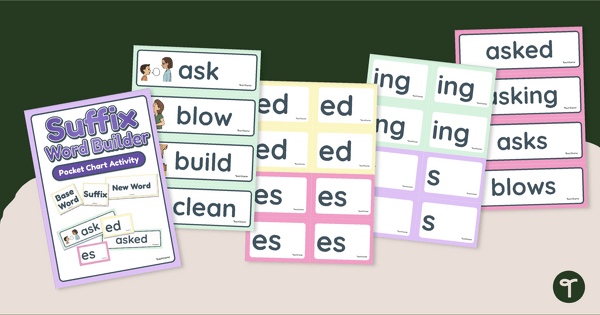
Suffix Word Building Activity
Build words using the suffixes -ed, -es, -s, and -ing with a printable word-building pocket chart card pack.
- Plus Plan
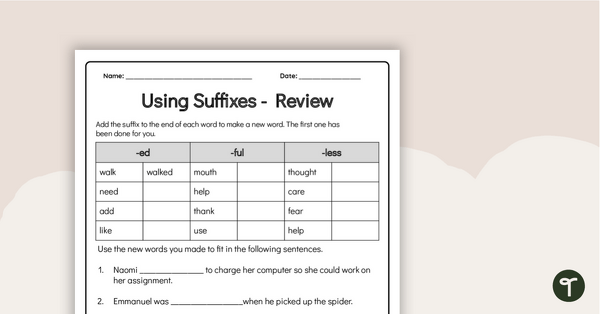
Using Suffixes - Grammar Worksheet
Review concepts related to suffixes with a printable grammar worksheet.
- Plus Plan
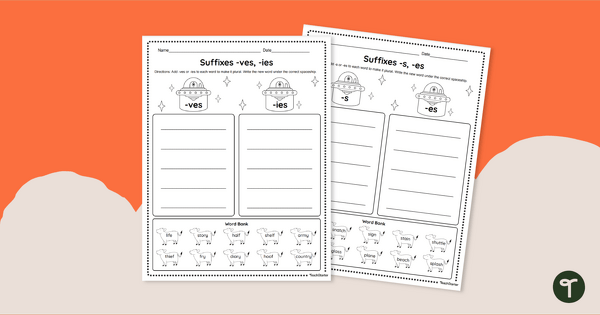
Sort the Suffixes - Worksheets
Practise using the suffixes -s, -es, -ies and -ves with a pack of printable add-a-suffix worksheets.
- Plus Plan
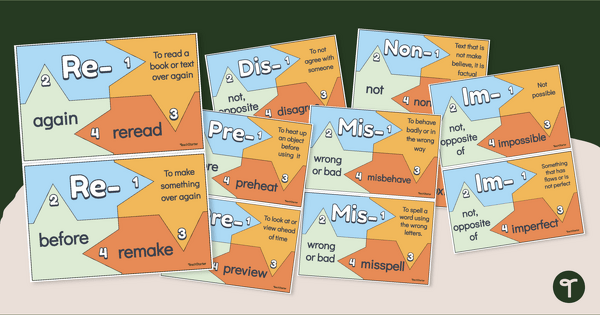
Prefix Puzzles - Literacy Centre
Grow your students’ vocabularies with prefix puzzles in your literacy centres.
- Free Plan
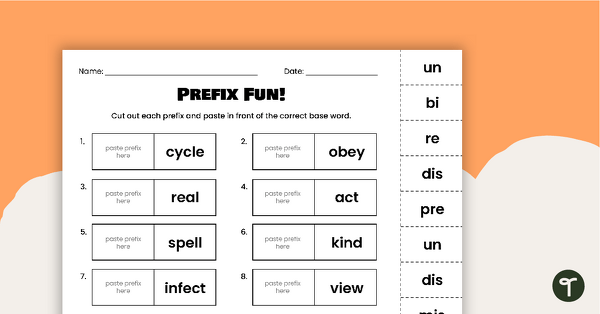
Prefix Fun! - Cut and Paste Worksheet
Cut and paste to build words with prefixes with an engaging worksheet activity.
- Free Plan
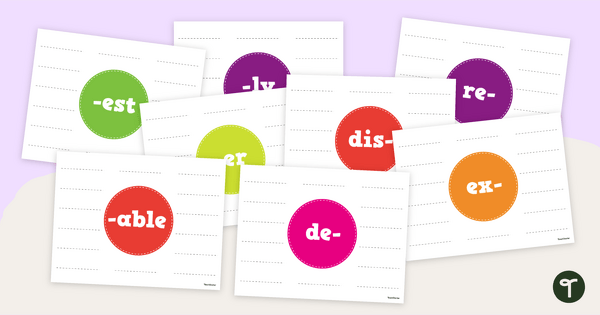
Prefix and Suffix Gallery Walk Activity
Get your students up and learning about prefixes and suffixes with an engaging gallery walk activity.
- Plus Plan
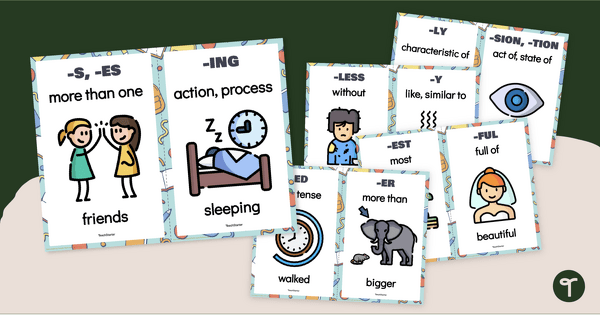
Suffix Mini Anchor Charts
Give your students a visual reminder of the meanings of 28 affixes with a printable set of miniature suffix anchor charts.
- Plus Plan
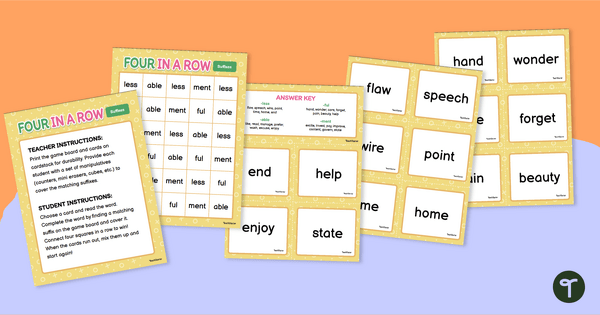
Four in a Row Vocabulary Game - Suffixes
Practise matching words to their common suffixes and build vocabulary with a suffix vocabulary game.
- Plus Plan
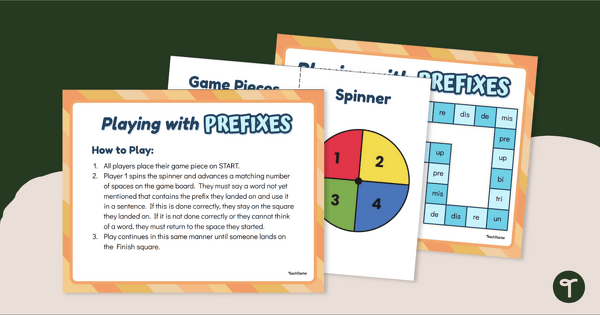
Printable Vocabulary Games - Playing with Prefixes
Practise building and using words with common prefixes with a fun prefix vocabulary game.
- Plus Plan
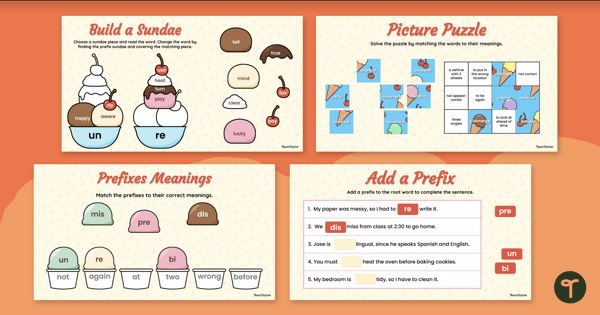
Google Slides Interactive - Prefixes Activity
Practise adding prefixes to words by identifying, defining, and matching them in context.
- Plus Plan
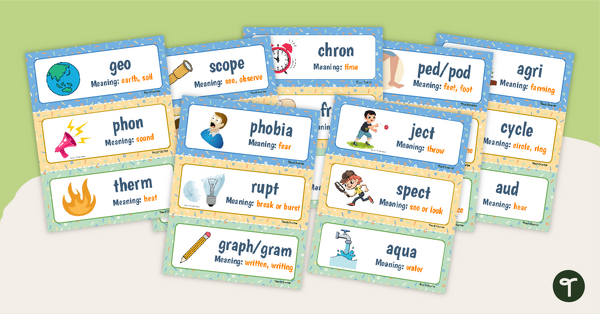
Greek and Latin Root Words - Illustrated Word Wall
Use word wall displays to build student vocabulary with daily exposure to Greek and Latin root words.
- Plus Plan
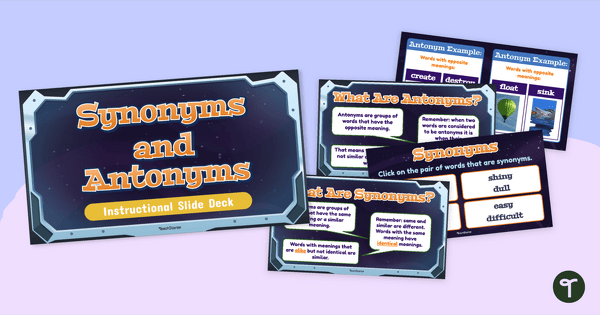
Synonym and Antonym Instructional Slides
Build skills in identifying synonyms and antonyms with an interactive instructional slide deck.
- Free Plan
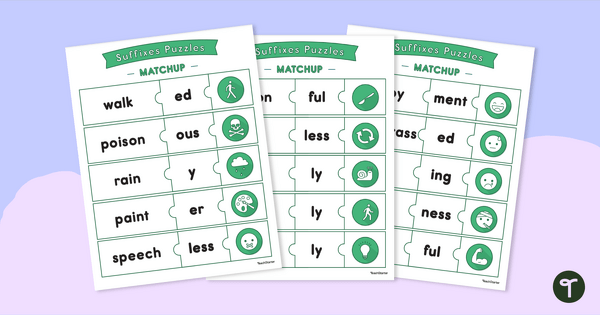
What is an Affix? Suffix Puzzle Pack
Practice building, reading, and understanding the meaning of words with suffixes with a fun set of printable puzzles for kids.
- Plus Plan
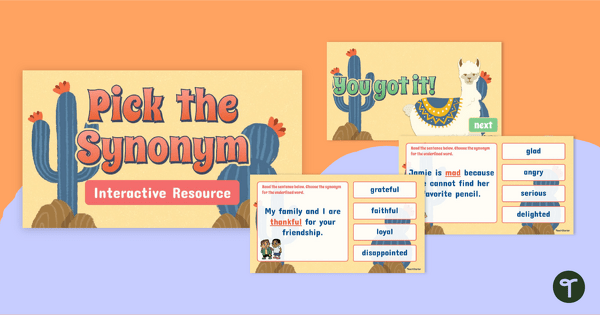
Pick the Synonym - Self-Checking Interactive Activity
Build some ‘llama-zing’ vocabulary skills using a fun llama-themed self-checking activity with synonyms!
- Plus Plan
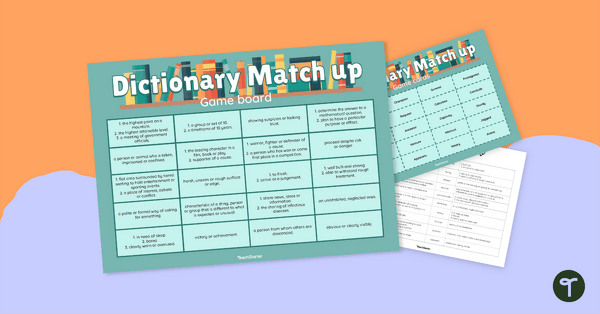
Dictionary Definitions Match Up Game
A set of 20 word cards for students to match to their definition.
- Plus Plan
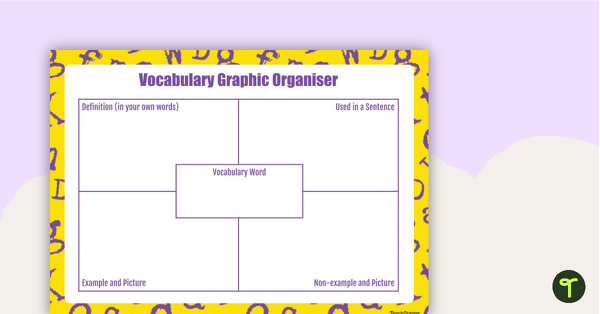
Frayer Model Template
Work on your students' vocabulary development with this Frayer Model template.
- Plus Plan
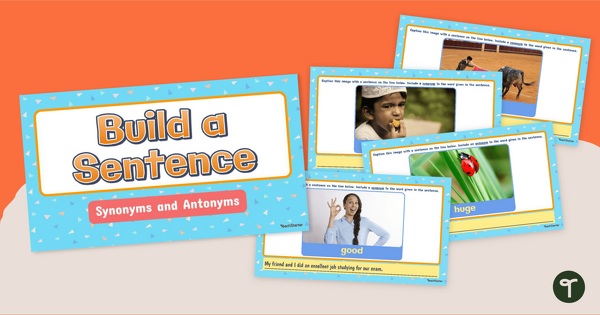
Synonyms and Antonyms - Build a Sentence Interactive
Build a strong vocabulary and sentence-writing skills with an interactive synonyms and antonyms sentence-building activity.
- Plus Plan
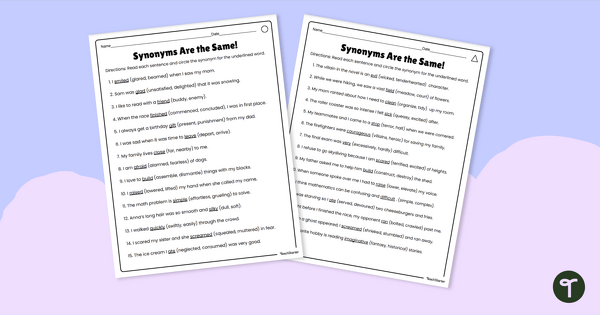
Synonyms Are the Same! Differentiated Worksheets
Practise identifying and using synonyms in sentences with differentiated synonyms worksheets.
- Plus Plan
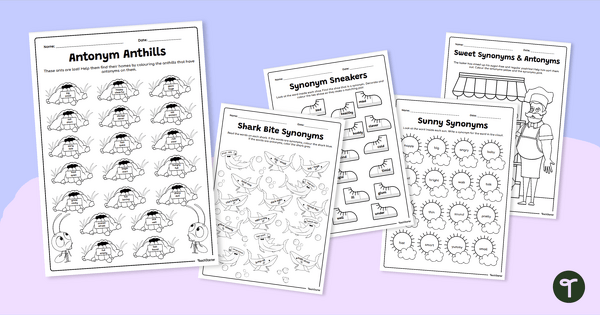
Synonyms and Antonyms - Worksheet Pack
Practice identifying and using synonyms and antonyms with five fun vocabulary worksheets.
- Plus Plan
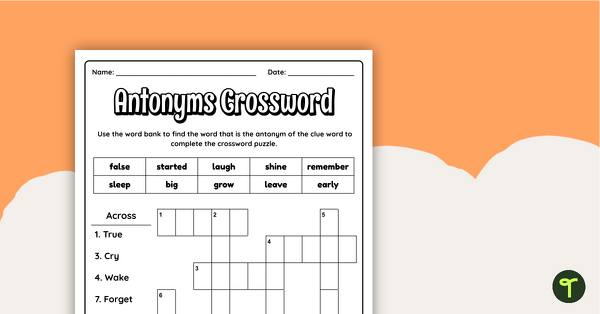
Antonyms Crossword Puzzle
Turn your language learners into vocabulary superstars with a fun antonym crossword puzzle.
- Plus Plan
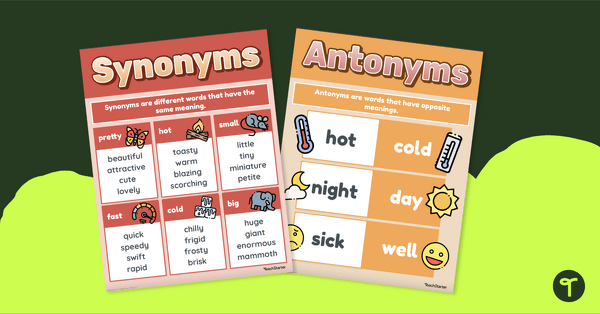
Synonym and Antonym Posters
Print a pair of handy synonym and antonym anchor charts for your students to reference during writing lessons.
- Plus Plan
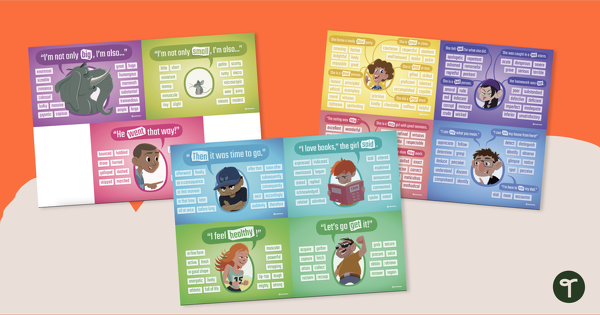
Synonyms - Printable Flashcards
Build vocabulary skills with individual Synonym anchor chart flash cards.
- Plus Plan
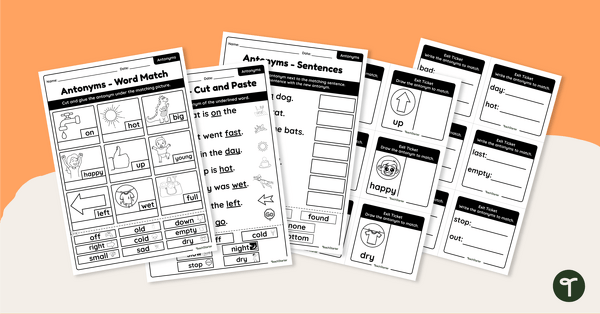
Antonyms Worksheets - Year 1
Practise reading and identifying antonyms with a pack of five antonym worksheets for Year 1 students.
- Plus Plan
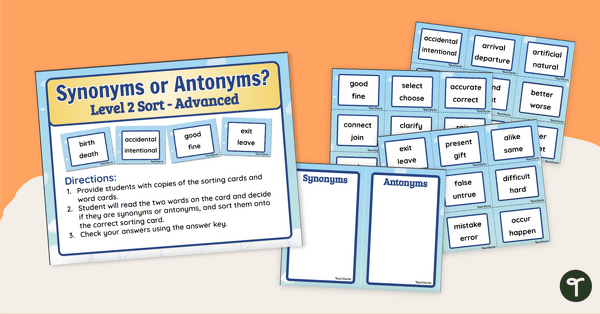
Synonyms or Antonyms? Level 2 Sorting Activity
Identify synonyms and antonyms with a sorting activity designed for upper years students.
- Free Plan
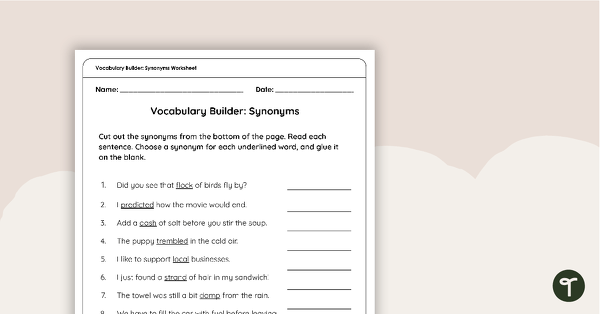
Vocabulary Builder - Synonym Worksheet
Practice synonym matching with this cut-and-paste worksheet.
- Plus Plan
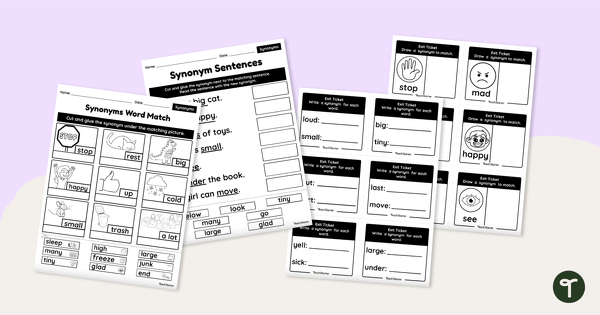
Synonyms Worksheets - Year 1
Practise identifying and using synonyms with a set of four synonym worksheets for Year 1 students.
- Plus Plan
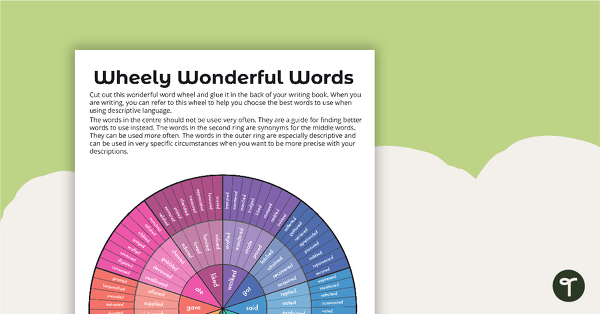
Wheely Wonderful Words – Overused Verbs
Get rid of those overused verbs with a word wheel of synonyms.
- Plus Plan
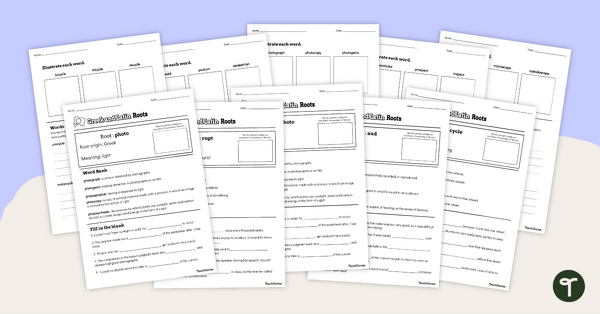
Greek and Latin Roots Worksheet Set
Practise using vocabulary containing Greek roots and Latin roots with these weekly root word worksheets.
- Plus Plan
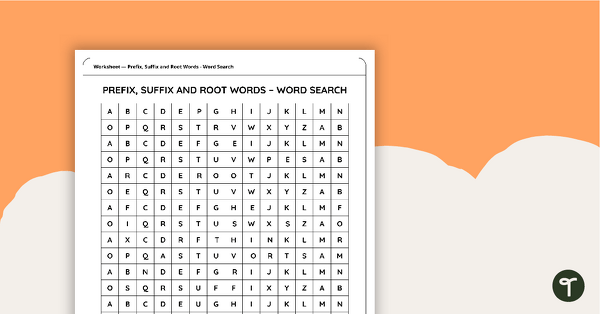
Prefix, Suffix and Root Words Word Search
Identify terminology related to prefixes, suffixes and root words in this word search.
- Plus Plan
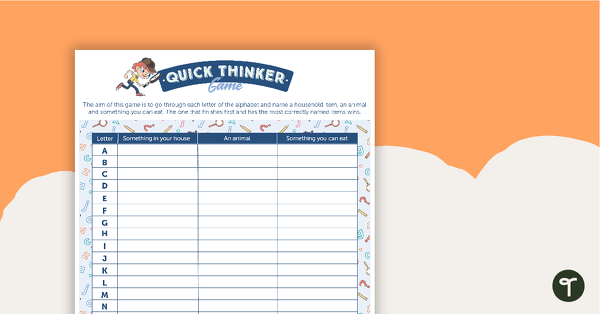
Quick Thinker Game – Worksheet
An alphabet racing game to help prompt vocabulary knowledge.
- Plus Plan
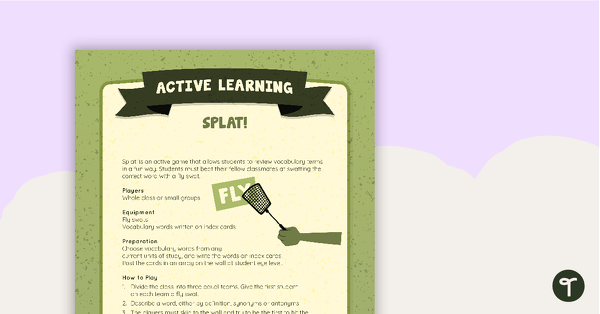
Splat! Active Game
An active game that allows students to test and build their vocabulary knowledge.
- Plus Plan
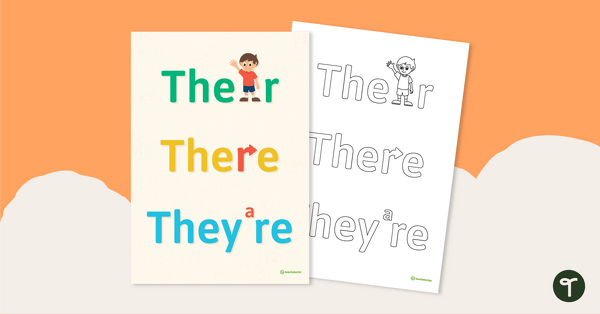
Their, There, They're Poster
Teach students to differentiate between their, there and they're with this classroom poster.